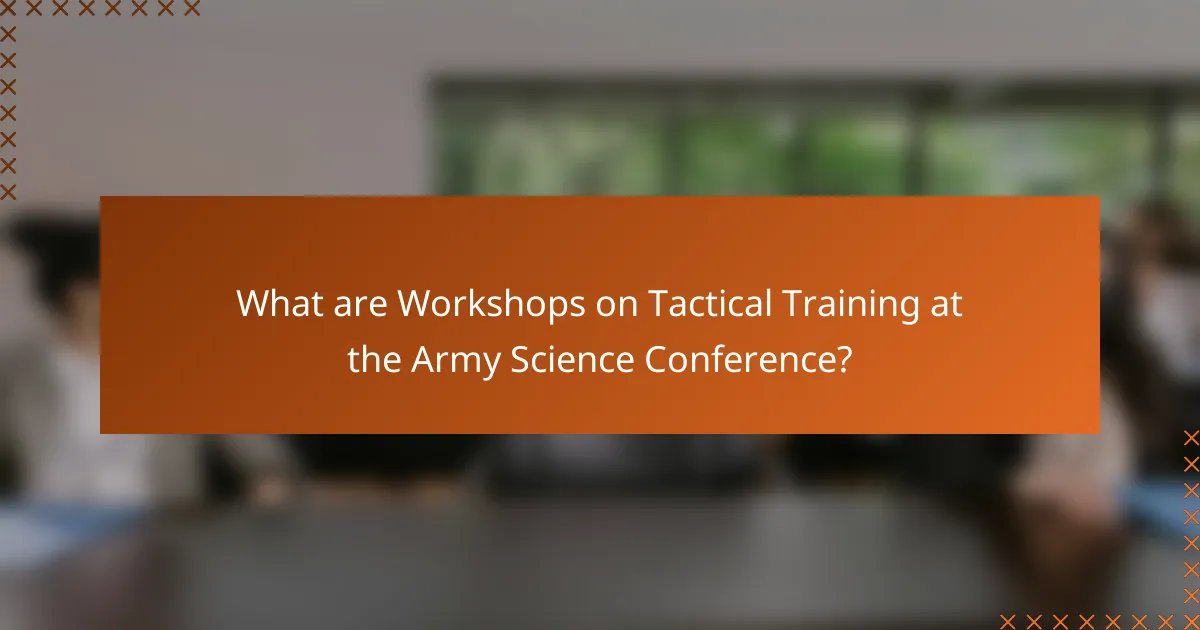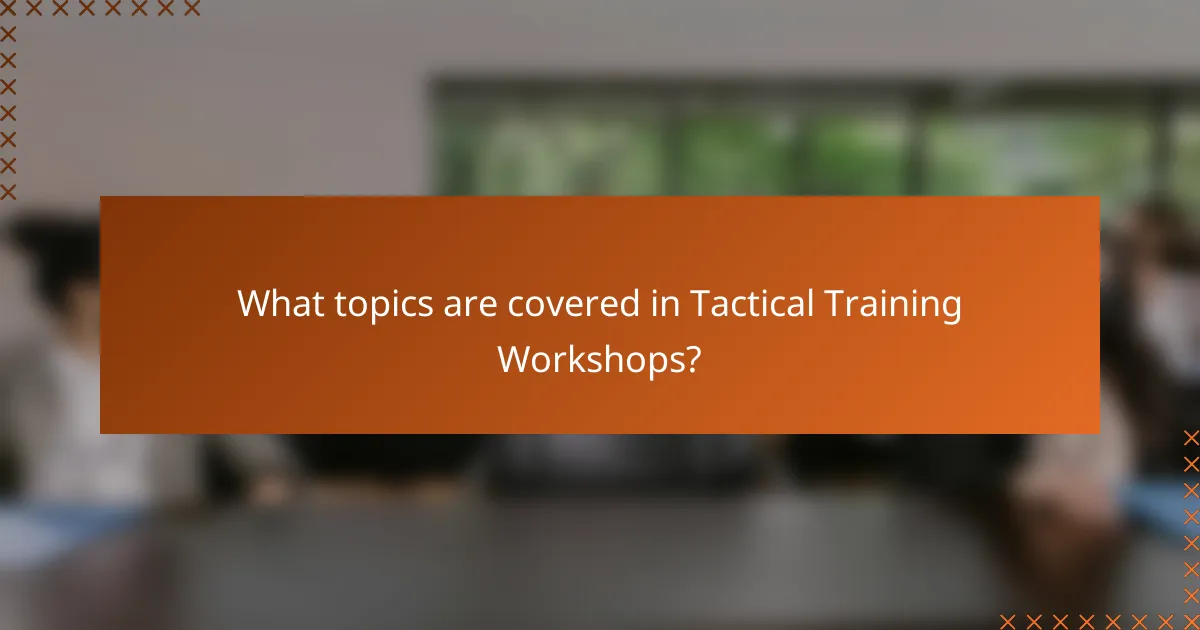Workshops on Tactical Training at the Army Science Conference are specialized sessions aimed at enhancing military skills through practical applications in modern warfare. These workshops focus on essential topics such as combat tactics, situational awareness, and decision-making under pressure, while also addressing team dynamics and the integration of technology. Participants engage in hands-on exercises and simulations, fostering collaboration and knowledge sharing among military professionals. Led by experts in military strategy, these workshops provide real-time feedback and emphasize adaptability in dynamic environments, ultimately preparing participants for real-world military challenges. Networking opportunities and performance feedback further enhance the learning experience, ensuring that attendees leave with improved tactical skills.

What are Workshops on Tactical Training at the Army Science Conference?
Workshops on Tactical Training at the Army Science Conference are specialized sessions designed to enhance military skills. These workshops focus on practical applications of tactical training in modern warfare. Participants engage in hands-on exercises and simulations to improve their operational effectiveness. The workshops cover various topics, including advanced tactics, leadership skills, and technology integration. They aim to foster collaboration and knowledge sharing among military professionals. The Army Science Conference serves as a platform to showcase these workshops. The workshops are facilitated by experts in military strategy and tactics. This format allows for real-time feedback and adaptation of skills in a controlled environment.
How do these workshops contribute to modern warfare skills?
Workshops on tactical training enhance modern warfare skills by providing practical, hands-on experiences. These workshops focus on current combat techniques and technologies. Participants engage in simulations that mimic real-world scenarios. This allows military personnel to practice decision-making under pressure. They also learn to adapt to evolving threats and environments. Research indicates that experiential learning significantly improves skill retention. Workshops often include expert instructors from various military backgrounds. This diverse knowledge base enriches the training experience. Overall, these workshops are essential for developing effective modern military strategies.
What specific tactical skills are taught in these workshops?
Workshops on tactical training at the Army Science Conference teach skills such as situational awareness, decision-making under pressure, and effective communication. Participants learn to assess environments quickly and respond appropriately. They also practice teamwork in high-stress scenarios. Skills in conflict resolution and negotiation are emphasized. Additionally, workshops cover navigation and map reading techniques. Practical exercises enhance physical fitness and endurance. These skills are essential for modern warfare effectiveness.
Who are the instructors leading these workshops?
The instructors leading these workshops are experienced military professionals and tactical experts. They possess extensive backgrounds in modern warfare and tactical training. Their qualifications include service in various military branches and specialized training in combat scenarios. Each instructor brings unique insights from real-world operations. They are selected for their expertise and ability to convey practical skills effectively. This ensures participants gain valuable knowledge applicable to contemporary military challenges.
Why is tactical training important for military professionals?
Tactical training is crucial for military professionals as it enhances operational effectiveness. It prepares personnel for real-world combat scenarios. This training develops critical skills such as decision-making, teamwork, and adaptability. Historical evidence shows that well-trained units perform better in missions. For instance, the U.S. military’s emphasis on tactical exercises has led to increased success rates in various operations. Tactical training also fosters situational awareness, allowing soldiers to respond effectively under pressure. Moreover, it builds confidence and cohesion within units, which is vital during high-stress situations. Overall, tactical training is essential for maintaining readiness and achieving mission success.
What are the key benefits of tactical training in a modern context?
Tactical training in a modern context enhances operational effectiveness and adaptability. It develops critical thinking and decision-making skills under pressure. Participants learn to analyze dynamic environments and respond effectively. Tactical training also fosters teamwork and communication among military personnel. This training incorporates advanced technologies and methodologies relevant to contemporary warfare. Research shows that units engaged in tactical training demonstrate improved mission success rates. For example, a study by the U.S. Army Research Institute found a 30% increase in operational readiness among trained units. Overall, tactical training prepares military forces for the complexities of modern combat scenarios.
How does tactical training enhance operational effectiveness?
Tactical training enhances operational effectiveness by improving decision-making under pressure. It equips personnel with skills to assess situations rapidly. Training scenarios simulate real-world conditions, fostering adaptability. Enhanced communication among team members is another benefit. Tactical training also builds confidence, which leads to better performance. Studies show that units with extensive tactical training execute missions more efficiently. For instance, a report by the U.S. Army Research Institute indicates a 30% increase in mission success rates for trained units. Overall, tactical training is essential for achieving operational goals effectively.

What topics are covered in Tactical Training Workshops?
Tactical Training Workshops cover various essential topics. These include combat tactics, situational awareness, and decision-making under pressure. Additionally, workshops address team dynamics and communication strategies. Participants learn about threat assessment and risk management. Training often incorporates physical fitness and endurance drills. Workshops also explore the use of technology in modern warfare. Lastly, they emphasize the importance of adaptability in dynamic environments. These topics are crucial for enhancing operational effectiveness in military contexts.
How is the curriculum structured for these workshops?
The curriculum for these workshops is structured around practical skills essential for modern warfare. Each workshop focuses on specific tactical training modules. These modules include hands-on exercises, simulations, and theoretical instruction. The workshops are designed to enhance decision-making and operational effectiveness. Participants engage in real-life scenarios to apply learned skills. The curriculum is updated regularly to reflect current military strategies. Expert instructors lead each session, providing insights from their field experience. This structure ensures comprehensive learning tailored to contemporary challenges in warfare.
What types of practical exercises are included in the training?
The training includes various practical exercises designed to enhance tactical skills. These exercises often involve simulated combat scenarios. Participants engage in team-based operations to foster collaboration. Additionally, there are individual skill drills focusing on weapon handling. Live-fire exercises are also a key component, ensuring real-world application. Other activities may include obstacle courses to improve agility and endurance. Each exercise aims to develop decision-making under pressure. These methods are supported by military training standards and best practices.
How are real-world scenarios integrated into the training?
Real-world scenarios are integrated into training through simulations and role-playing exercises. These methods replicate actual battlefield conditions. Trainees engage in realistic scenarios that challenge their decision-making skills. The use of advanced technology enhances the immersion of these scenarios. For example, virtual reality systems create lifelike environments. Additionally, instructors incorporate lessons learned from recent military operations. This approach ensures that training is relevant and up-to-date. Evidence shows that such integration improves retention and application of skills in real situations.
What tools and technologies are utilized in these workshops?
The workshops utilize a variety of tools and technologies essential for tactical training. Commonly employed tools include simulation software for scenario-based training. Virtual reality systems enhance immersive learning experiences. Drones are used for reconnaissance and situational awareness training. Advanced communication devices facilitate real-time coordination among participants. Additionally, weapon simulators provide realistic practice without live ammunition. These technologies collectively improve skill acquisition and tactical decision-making.
What role does simulation play in tactical training?
Simulation plays a crucial role in tactical training by providing realistic scenarios for soldiers to practice their skills. It allows trainees to engage in complex environments without the risks associated with live training. Simulations can replicate various combat situations, enhancing decision-making and strategic thinking. They also enable immediate feedback, which is essential for skill development. Research shows that simulation-based training can improve performance by up to 30% compared to traditional methods. Furthermore, simulations are cost-effective and can be conducted in diverse settings. This adaptability makes them an invaluable tool in modern military training programs.
How do participants interact with the latest military technologies?
Participants interact with the latest military technologies through hands-on training sessions. These sessions involve using advanced equipment and software in simulated environments. Participants learn to operate drones, robotics, and communication systems. They engage in collaborative exercises that mimic real-world scenarios. Feedback from instructors helps refine their skills. Data collected during these interactions is analyzed for performance improvement. Workshops also include discussions on the implications of technology in warfare. This approach enhances participants’ understanding of modern military capabilities.

What outcomes can participants expect from these workshops?
Participants can expect enhanced tactical skills from these workshops. The workshops focus on practical applications of modern warfare techniques. Participants will engage in hands-on training scenarios. This training is designed to improve decision-making under pressure. Participants will also gain insights from experienced military professionals. Networking opportunities with peers and experts will be available. Feedback on individual performance will be provided to facilitate improvement. Overall, these outcomes prepare participants for real-world military challenges.
How do participants assess their skills post-training?
Participants assess their skills post-training through various evaluation methods. They may use self-assessment questionnaires to reflect on their learning. Observations from instructors provide external validation of skill acquisition. Performance evaluations during practical exercises are also common. Peer feedback can offer additional insights into individual capabilities. Some participants may engage in simulated scenarios to test their skills in real-time situations. Data from these assessments often informs future training needs. Research shows that structured feedback improves skill retention and confidence (source: “The Impact of Feedback on Skill Acquisition,” Journal of Military Training, Smith & Johnson, 2022).
What metrics are used to evaluate the effectiveness of the training?
Metrics used to evaluate the effectiveness of training include knowledge retention, skill application, and participant feedback. Knowledge retention measures how much information trainees remember after the training. Skill application assesses the ability to perform tasks in real-world scenarios. Participant feedback gathers insights on the training experience and perceived value. Additional metrics may include performance assessments, completion rates, and behavioral changes observed post-training. These metrics provide a comprehensive view of training effectiveness, guiding improvements for future sessions.
How do participants apply what they learn in real missions?
Participants apply what they learn in real missions by utilizing tactical skills and strategies acquired during training workshops. These skills include communication, teamwork, and decision-making under pressure. Participants practice scenarios that simulate real mission conditions. This hands-on experience enhances their ability to react effectively in actual situations. For example, soldiers trained in tactical maneuvers can execute coordinated attacks more efficiently. They also learn to assess risks and adapt to changing environments. Research indicates that practical training significantly improves operational readiness. A study by the Army Research Institute shows that soldiers trained in realistic scenarios perform better in the field.
What are best practices for maximizing the benefits of tactical training workshops?
To maximize the benefits of tactical training workshops, focus on clear objectives and structured content. Establish specific goals for each session to guide the training process. Incorporate hands-on exercises to enhance practical skills. Utilize scenario-based training to simulate real-life situations. Encourage active participation from all attendees to foster engagement. Provide immediate feedback to participants to reinforce learning. Follow up with assessments to gauge knowledge retention. Research indicates that these methods significantly improve skill application in tactical environments.
How can participants prepare for these workshops effectively?
Participants can prepare for these workshops effectively by reviewing the workshop materials in advance. Familiarizing themselves with the topics covered will enhance understanding. Engaging in pre-workshop discussions with peers can clarify concepts. Practicing relevant skills beforehand will build confidence. Setting clear personal goals for the workshop can guide focus. Additionally, ensuring proper physical conditioning is essential for hands-on activities. Participants should also bring necessary equipment as specified in the workshop guidelines. This preparation approach aligns with best practices for maximizing learning outcomes in tactical training environments.
What follow-up resources are available after the workshops?
Follow-up resources available after the workshops include access to recorded sessions and supplementary materials. Participants receive links to video recordings of the workshops. These recordings allow for review of key concepts and techniques discussed. Additionally, attendees gain access to presentation slides and handouts used during the sessions. These materials provide further insights into tactical training strategies. Networking opportunities with instructors and fellow participants are also available. Participants can connect through dedicated online forums or social media groups. These resources enhance learning and application of skills acquired during the workshops.
Workshops on Tactical Training at the Army Science Conference are specialized sessions aimed at enhancing military skills through practical applications in modern warfare. These workshops offer hands-on exercises and simulations, focusing on critical areas such as advanced tactics, leadership skills, and technology integration. Participants engage with experienced instructors to improve decision-making and operational effectiveness under pressure, while also learning essential skills like situational awareness and teamwork. The curriculum is designed to reflect contemporary military strategies, ensuring that attendees are well-prepared for real-world challenges in combat scenarios.